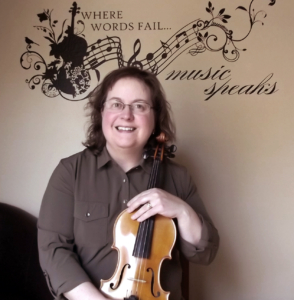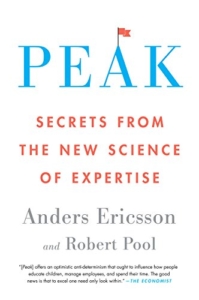
Minds Need Muscles! Did you attend any workshops at the WSMTA Conference in June, or other professional development events? Read any books on improving performance? This summer I read “Peak” by Anders Ericsson. He is one of the originators of the famous “10,000 Hours” study, which involved college-level violin students in Berlin. He says that the study’s findings have been misrepresented by subsequent authors. His focus in “Peak” is on how skills are built through “deliberate practice” – quality vs. quantity. I’m sure that’s not news to most music teachers! But some insights grabbed me in a new way, because I need to apply them for myself. Here’s one: “Attending lectures, mini courses, and the like offers little or no feedback and little or no chance to try something new, make mistakes, correct the mistakes, and gradually develop a new skill.”

These bobblehead guys in my studio represent The Mind (Einstein) and The Muscles (Hulk). They help me explain to students that, while their mind may think it immediately understands a new technical concept, their muscles will need lots of correct repetitions to make that new technique a habit. Turns out, I need to “practice” what I preach! I have been challenged to try out the new tips and tricks I’ve gleaned as soon as possible, instead of filing them away in a “Presentations” folder. You have one of those, right? What are the top teaching insights you collected this summer, and how can you put them into practice right away?

2023-24 Program Updates for Vocal and Instrumental Teachers
- Music Literacy Program updates for viola, cello and bass teachers: Now that the most current versions of the Music Literacy Program tests can be downloaded directly from the WSMTA website, changes can be more quickly rolled out and put into immediate use. Updates and extensions of the Music Literacy Program tests just for bowed string instruments are coming for 2023-24! This summer a team of Kitsap Chapter teachers of viola, cello and string bass have been working on updating the Technique tests (10 levels of scales and arpeggios), and extending the Sight Reading and Theory tests to at least Level 6 for these instruments. The changes should be available on the WSMTA site no later than the end of September. The MLP Vocal and Instrumental Curriculum Guide will help you prepare your students before your testing date. When planning your MLP event, make sure you download your test materials and Curriculum Guide from the WSMTA site to make sure you have the most recent editions!
- Online Music Artistry Programs are available for teachers of all vocal/instrumental specialties that have WSMTA-approved Visiting Artists. Contact me or MAP Chair Jason Kuo for more information.
Jane Melin, NCTM
WSMTA Vocal/Instrumental Chair
[email protected]